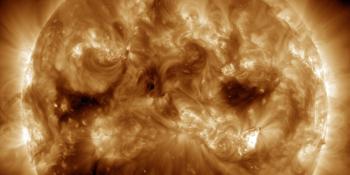Viewing archive of Sunday, 18 July 2004
Solar activity report
Any mentioned solar flare in this report has a scaling factor applied by the Space Weather Prediction Center (SWPC). Because of the SWPC scaling factor, solar flares are reported as 42% smaller than for the science quality data. The scaling factor has been removed from our archived solar flare data to reflect the true physical units.
Report of Solar-Geophysical Activity 2004 Jul 18 2200 UTCPrepared by the NOAA © SWPC and processed by SpaceWeatherLive.com
Joint USAF/NOAA Report of Solar and Geophysical Activity
SDF Number 200 Issued at 2200Z on 18 Jul 2004IA. Analysis of Solar Active Regions and Activity from 17-2100Z to 18-2100Z Solar activity remained at high levels today. Region
649 (S10E00) produced five M-class events, all of which occurred in
a constricted area around the delta structure in the trailing
portion of the spot group. The M-class flares chronologically
occurred with an M2/1f at 17/2131Z, an M1 x-ray at 17/2308Z, an
M2/1f at 18/0035Z, an M1/Sf at 18/0257Z, and an M1/1f at 18/1713Z.
Weak radio bursts accompanied many of today's events while LASCO
imagery depicted only faint CME signatures in association with the
flare activity observed during the period. Magnetically, Region 649
remains a beta-gamma-delta spot group. Region 652 (N05E58) has
fully rotated into view today and is currently measured in white
light at over 1300 millionths of spot area coverage. Several
C-class flares were observed during the period and a strong delta
structure is evident in the intermediate cluster of spots. No new
regions were numbered today.
IB. Solar Activity Forecast
Solar activity is expected to be at
moderate to high levels. Region 649 and 652 are both capable of
producing major flare level activity.
IIA. Geophysical Activity Summary 17-2100Z to 18-2100Z
The geomagnetic field was at quiet to unsettled levels.
IIB. Geophysical Activity Forecast
The geomagnetic field is
expected to be at predominantly unsettled levels throughout the
period. Isolated active to minor storm conditions are possible on
19 and 20 July mostly at higher latitudes due to the potential for
transient passages from the major flare activity seen from Region
649 during the past several days.
III. Event Probabilities 19 Jul to 21 Jul
| Class M | 80% | 80% | 80% |
| Class X | 40% | 40% | 40% |
| Proton | 20% | 20% | 20% |
| PCAF | Green | ||
IV. Penticton 10.7 cm Flux
Observed 18 Jul 155 Predicted 19 Jul-21 Jul 150/150/145 90 Day Mean 18 Jul 098
V. Geomagnetic A Indices
Observed Afr/Ap 17 Jul 013/024 Estimated Afr/Ap 18 Jul 008/010 Predicted Afr/Ap 19 Jul-21 Jul 010/015-010/015-008/012
VI. Geomagnetic Activity Probabilities 19 Jul to 21 Jul
| A. Middle Latitudes | |||
|---|---|---|---|
| Active | 15% | 15% | 15% |
| Minor storm | 10% | 10% | 05% |
| Major-severe storm | 05% | 05% | 01% |
| B. High Latitudes | |||
|---|---|---|---|
| Active | 30% | 30% | 25% |
| Minor storm | 15% | 15% | 10% |
| Major-severe storm | 10% | 10% | 05% |
All times in UTC
Latest news
Latest forum messages
AR4048 43Unspecified geomagnetic activity 2151AR4046 137Solar Demon 3Aurora photography hints for those of us with smartphones 54
More topicsSupport SpaceWeatherLive.com!
A lot of people come to SpaceWeatherLive to follow the Sun's activity or if there is aurora to be seen, but with more traffic comes higher server costs. Consider a donation if you enjoy SpaceWeatherLive so we can keep the website online!

Space weather facts
| Last X-flare | 2025/03/28 | X1.1 |
| Last M-flare | 2025/03/31 | M1.2 |
| Last geomagnetic storm | 2025/03/27 | Kp5 (G1) |
| Spotless days | |
|---|---|
| Last spotless day | 2022/06/08 |
| Monthly mean Sunspot Number | |
|---|---|
| February 2025 | 154.6 +17.6 |
| March 2025 | 127 -27.6 |
| Last 30 days | 127 -25.7 |


